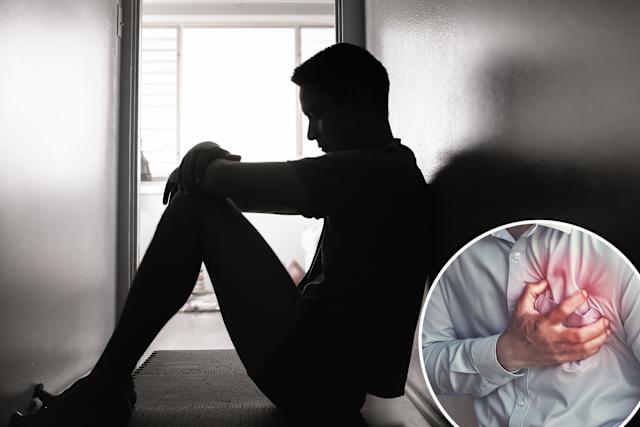Broken heart syndrome, scientifically known as takotsubo cardiomyopathy (TC), is a condition that demonstrates the powerful and sometimes perilous link between intense emotional or physical stress and heart health. While often associated with the psychological pain of losing a loved one or undergoing immense stress, recent research underscores a surprising and concerning disparity in its outcomes: men are significantly more likely to die from the condition than women.
A new, large-scale study published in the Journal of the American Heart Association examined nearly 200,000 adult hospital patients across the United States who were diagnosed with takotsubo cardiomyopathy between 2016 and 2020. This comprehensive analysis provides stark data highlighting the critical differences in how men and women are affected by this stress-induced heart condition.
Key Findings on Mortality:
The study’s most striking finding is the difference in mortality rates based on gender. Although women constitute the overwhelming majority of takotsubo cardiomyopathy cases, accounting for 83% of diagnoses in the study population, men experience significantly higher mortality. Specifically, 11.2% of men diagnosed with the syndrome died, compared to just 5.5% of women. This means men are more than twice as likely as women to die from broken heart syndrome. The overall death rate among all patients in the study was 6.5 percent.
This finding reinforces previous research and appears to be a consistent pattern. As Dr. Harmony Reynolds, director of the Sarah Ross Soter Center for Women’s Cardiovascular Research at NYU Langone Health, commented, it seems “men don’t get takotsubo syndrome as much, but when they do, they do worse”.
Understanding Takotsubo Cardiomyopathy:
Takotsubo cardiomyopathy occurs when the heart’s ability to pump blood is temporarily weakened. The condition is typically triggered by intense emotional or physical stress. Common emotional triggers can include a divorce, the death of a loved one, or losing a job. Physical stressors, such as a surgery or stroke, can also precipitate the syndrome.
The mechanism behind TC is thought to involve a surge of stress hormones, such as adrenaline. These hormones may result in the squeezing of the large or small arteries of the heart. While broken heart syndrome mimics a heart attack, presenting with symptoms like chest pain and shortness of breath, it typically does not involve blocked arteries, which are characteristic of a traditional heart attack. Doctors diagnosing the condition often look for a specific sign: part of the heart muscle becoming enlarged like a balloon, occurring in the absence of blocked arteries. Most patients are also able to identify a stressful event that preceded the episode.
Though many patients recover quickly from broken heart syndrome, a small minority suffer more serious outcomes, including heart failure.
Exploring the Gender Disparity in Outcomes:
The significant difference in death rates between men and women afflicted by takotsubo cardiomyopathy has led researchers and cardiologists to propose several hypotheses based on the available data.
One prominent theory centers on the type of stressor that triggers the condition. Cardiologists involved in discussions around the study suggested that the difference in outcomes between men and women could be linked to what brings on their conditions. The data suggests that broken heart syndrome in men is usually brought on by a physical stressor, such as a stroke or a surgery. In contrast, in women, the impetus is typically emotional, such as losing a job or a loved one.
Dr. Ilan Wittstein, a cardiologist at Johns Hopkins Medicine, noted that patients with emotional stressors “actually do quite well”. He suggested that men “may be more at risk for dying and having bad outcomes because they’re less susceptible to begin with”. This line of reasoning implies that if men are less prone to developing the syndrome from milder triggers, it might take a more dangerous or severe stressor to precipitate the condition in men, potentially leading to worse outcomes. The researchers also noted that physical stress TC is more common in men, which may contribute to the higher number of deaths seen in this group.
Another potential factor contributing to the disparity in outcomes is the difference in social support networks. Lead author Dr. Mohammad Movahed, a cardiologist at the University of Arizona’s Sarver Heart Center, and other researchers have suggested that men may have a harder time recovering from broken heart syndrome because they tend to have less social support to help them manage stress. An earlier Pew Research study cited by the sources suggested that men “seem to turn to their networks less often” for social connection and emotional support. Dr. Movahed explained that if the stressful trigger persists and the stress is not managed, it “is probably going to continue to harm the heart, or at least reduce the chance of recovery”. This lack of adequate stress management support could play a role in the poorer prognosis for men.
Differences in hormone balances between the sexes have also been put forward as a potential factor influencing the differing outcomes. While the exact mechanisms are still being explored, hormonal differences could affect the body’s response to stress hormones and their impact on the heart.
Complications Associated with TC:
The study also highlighted the significant complications associated with takotsubo cardiomyopathy. Patients diagnosed with the condition experienced a range of serious issues. The most common complication was congestive heart failure, affecting 35.9% of patients. Other notable complications included atrial fibrillation (20.7%), cardiogenic shock (6.6%), stroke (5.3%), and cardiac arrest (3.4%).
Alarmingly, the study found no significant improvement in patient outcomes over the five-year period studied. The rate of in-hospital complications was also elevated.
Lingering Questions and Future Directions:
Despite the growing understanding of takotsubo cardiomyopathy, significant questions remain about the condition. Scientists are still seeking the fundamental cause of the syndrome and exactly why some individuals die from it, particularly in rare cases. As Dr. Wittstein put it, “People are still looking for the holy grail of what causes this condition”.
While intense stress is a known trigger, it’s not entirely clear if stress alone is always sufficient. Dr. Wittstein mentioned that everyday annoyances like getting stuck at a red light or mild frustration at work, or even slightly vigorous exercise, might not be enough to trigger the condition in some people. However, Dr. Matthew Tomey, a cardiologist at Mount Sinai Fuster Heart Hospital, noted that the stresses endured in daily life, both physical and emotional, can “in fact take tolls on us”. He added that you can literally feel heartache in stressful moments, and “there may literally be some heartache of sorts that’s accompanying that”. While not every case is caused by relationship breakups, losing someone can have significant consequences for physical and mental health, and the heart can indeed take the brunt of the stress.
The continued high death rate from TC is described as “alarming” by Dr. Movahed. This alarming statistic underscores the need for more research aimed at improving treatment and finding new therapeutic approaches. The researchers emphasize the importance of raising awareness of takotsubo cardiomyopathy so that it can be better diagnosed and treated more effectively.
Furthermore, understanding the gender disparities in outcomes is crucial for developing targeted interventions. Researchers note that further studies are needed specifically to explore these differences.
There is potential for preventing some complications. Dr. Movahed suggested that certain issues, such as embolic stroke, might be preventable with the early use of anti-clotting medications in patients with a substantially weakened heart muscle or an irregular heart rhythm like atrial fibrillation, which increases stroke risk.
Recognizing Symptoms and Seeking Help:
The sources stress the importance for individuals not to dismiss symptoms like sudden chest pains or shortness of breath, even if they believe they are simply experiencing stress. These are symptoms that mimic a heart attack, and it is critical to seek medical attention immediately. Seeing a doctor when these symptoms occur is the recommended course of action. While health professionals have known about TC for some time, increasing awareness among both the public and medical community is vital for ensuring timely diagnosis and improving patient outcomes.
In conclusion, the new study published in the Journal of the American Heart Association highlights a critical and previously perhaps underappreciated risk: men are significantly more vulnerable to dying from broken heart syndrome when they develop the condition, despite it being less common in men than in women. While the exact reasons for this disparity are still being investigated, hypotheses point to potential differences in the type of triggering stressor, the role of social support in managing stress, and possibly hormonal factors. Given the relatively high death rate and significant complications associated with the syndrome, especially in men, continued research and increased awareness are paramount to developing more effective treatments and ultimately saving lives. Recognizing the symptoms and seeking prompt medical evaluation remains essential.

